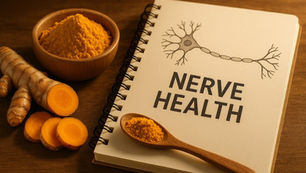top of page
Insights from Nature


The Importance of Turmeric Purity: How to Identify Authentic Turmeric Powder
Whether you’re buying turmeric for cooking or for health purposes, knowing how to identify pure turmeric powder ensures you get the real curcumin benefits your body deserves.
Pure turmeric powder has a deep golden-yellow color, an earthy aroma, and dissolves evenly in warm water without leaving white residue. Authentic turmeric should list Curcuma longa on the label, test negative for synthetic dyes, and ideally be certified organic or lab-tested for purity.


Turmeric Supplements vs Tea: Which Delivers More Curcumin?
Turmeric can be enjoyed in many ways — stirred into a warm tea, sprinkled into food, or taken as a capsule. But when it comes to getting enough curcumin, the active compound that gives turmeric its golden color and health power, not all forms are equal. This article breaks down how much curcumin you actually get from turmeric supplements versus tea, and how to choose the most effective option. Turmeric supplements deliver far more curcumin than turmeric tea.


Fresh vs Powdered Turmeric — Which Form Is More Effective?
From golden curries to herbal teas, turmeric adds both color and wellness to everyday life. Fresh turmeric root offers natural essential oils and a milder curcumin concentration, while turmeric powder provides a more potent and stable source of curcuminoids. For most therapeutic uses—like supplements or teas—powdered or standardized turmeric curcumin extracts deliver stronger results, though fresh root shines in cooking and short-term detox support.


Curcumin 95% vs 97%: What Do the Numbers Really Mean?
When you buy a turmeric supplement, you’ll often see labels that read Curcumin 95% or Curcumin 97%. These numbers might seem small, but they carry important information about purity, potency, and absorption. Let’s break down what they mean, how they affect your health, and whether the extra 2% makes a real difference.
Curcumin 95% and 97% both refer to the standardization level of curcuminoids — the active compounds in turmeric responsible for most of its health benefits.


Will Turmeric Help Neuropathy?
Neuropathy affects millions of adults, especially those with diabetes, injuries, or chronic inflammation. Conventional treatments often provide partial relief but can have side effects, leading many to explore natural options like turmeric. Research suggests curcumin, the main active compound in turmeric root, may help protect nerves, reduce inflammation & support pain relief. But how strong is the evidence, & how can turmeric be used safely for nerve health? Let’s look at wh


Will Turmeric Break a Fast?
Intermittent fasting has become one of the most popular wellness practices for improving metabolism, gut health & energy levels. But many people who drink turmeric tea or take turmeric supplements in the morning wonder: Will turmeric break my fast? Turmeric itself does not break a fast when used in small amounts, but the details depend on what form you use & why you’re fasting. Let’s explore how turmeric curcumin interacts with the body during fasting & how to include it safe


Will Turmeric Stain Teeth or Skin?
While turmeric's benefits for inflammation and skin health are well-documented, many people notice that it can temporarily stain teeth, skin, or clothing.
The good news? These stains are harmless, short-lived, and easy to prevent or remove. In fact, when used properly, turmeric may even improve the brightness of your teeth & complexion. Let’s look at what causes these stains, what science says about turmeric’s effects on enamel and skin, & how to use it safely in your dail


Will Turmeric Cause Diarrhea or Constipation?
Turmeric (Curcuma longa) is well known for its anti-inflammatory and antioxidant properties, but many people wonder if it can upset the stomach or change bowel habits. Since turmeric curcumin supports bile production and gut function, it can affect digestion — for better or worse, depending on dosage and how it’s taken.
Let’s look at what the science says about turmeric side effects on digestion and how to enjoy its benefits without discomfort.


Turmeric Side Effects and Interactions Explained
Turmeric is not completely without side effects or interactions. While it is safe for most people when consumed as food or tea, taking concentrated forms can cause mild reactions or interact with certain medications. This comprehensive guide explains the possible side effects, who should use caution, how to minimize risks, and how to use it safely for maximum benefit.


Turmeric and Ashwagandha: Stress Relief and Balance
Turmeric (Curcuma longa) and ashwagandha (Withania somnifera) have been used for centuries in Ayurveda to promote physical strength, mental clarity, and emotional well-being. While turmeric is best known for its anti-inflammatory curcumin, ashwagandha is an adaptogen, meaning it helps the body adapt to stress and maintain equilibrium. When combined, these two herbs create a powerful natural formula that supports mood, reduces fatigue, and enhances both mental and physical res


Turmeric and Black Pepper: Why They Work Better Together
Turmeric is one of the world’s most researched herbs — celebrated for its vivid color & anti-inflammatory compound, curcumin. Yet there’s one challenge: on its own, curcumin isn’t absorbed efficiently by the body. Most of it passes through the digestive tract without reaching the bloodstream. That’s where black pepper (Piper nigrum) comes in. Its key compound, piperine, can increase the body’s ability to absorb curcumin by up to 2,000%.


Turmeric and Ceylon Cinnamon: Metabolic Harmony
Modern research confirms that both turmeric and cinnamon play important roles in regulating blood sugar, reducing inflammation, and supporting cardiovascular health. When combined, they create what herbalists call metabolic harmony — a natural way to stabilize energy, protect cells, and promote long-term wellness.


Turmeric and Ginger, Cayenne Pepper, Ceylon Cinnamon, Beetroot, Garlic, and Black Pepper: How Herbs Enhance Curcumin’s Power
Turmeric (Curcuma longa), known for its rich golden hue and potent active compound curcumin. This guide explores how six natural partners — ginger, cayenne pepper, Ceylon cinnamon, beetroot, garlic, and black pepper — amplify turmeric’s power, based on scientific findings and traditional wisdom. These combinations form the foundation of some of the most effective turmeric supplements, turmeric capsules, and even functional beverages like turmeric tea blends available today.


Curcuma Longa (Turmeric) for Health: Ancient Root & Modern Remedy
Curcuma longa, better known as turmeric, has long held its place in ancient healing traditions, particularly Ayurveda in India and Traditional Chinese Medicine. But this vibrant yellow root has gone far beyond the kitchen and the temple—it’s now a central focus of scientific research and supplement innovation. From inflammation to metabolic health, turmeric’s renaissance in modern wellness is both evidence-backed and widely embraced.Whether used fresh in traditional cooking,


What Happens When You Start Taking Turmeric?
Curcumin, the active compound responsible for most turmeric benefits, supports joints and immunity to promote digestion and mood balance. If you’ve just begun adding turmeric to your daily routine, you might wonder: What actually happens inside your body — and how long until you notice results? This article outlines the typical timeline of effects based on human research, so you’ll know what to expect in the first few weeks and months.


How Long Does It Take for Turmeric to Work for Weight Loss?
One question arises frequently: “How long does it actually take for turmeric to work for weight loss?” The answer depends on multiple factors — dosage, form, diet quality, exercise, & how consistently it’s used. While turmeric is not a quick fat-burning solution, its gradual metabolic effects have been confirmed by numerous clinical studies. This article examines how long turmeric takes to produce visible results, what happens in the body during that time & how to optimize i


What Does Mayo Clinic Say About Taking Turmeric Root?
Turmeric (Curcuma longa) has become one of the most researched herbal ingredients in modern health science. It’s praised for supporting inflammation balance, joint comfort, and overall wellness. But what do medical institutions like the Mayo Clinic actually say about turmeric and curcumin supplements? This article summarizes Mayo Clinic’s professional guidance, along with scientific findings from NIH and peer-reviewed studies, to help you understand how to use turmeric safely


Who Should Not Take Turmeric or Curcumin?
Turmeric is a well-known spice and herbal supplement recognized for its anti-inflammatory and antioxidant properties. While turmeric is safe for most people when used in food, not everyone should take turmeric or curcumin supplements, especially in high doses. Certain health conditions and medication combinations can make turmeric unsafe or require professional supervision. Understanding these risks helps ensure turmeric is used effectively and responsibly for long-term welln


Turmeric Safety and Usage Guidelines: What You Should Know
Turmeric (Curcuma longa) is widely recognized for its benefits in balancing inflammation, supporting metabolism & providing antioxidant protection. However, like all natural compounds with strong bioactivity, turmeric & its key component curcumin should be used with understanding & care. While most people tolerate turmeric well, certain health conditions & medication combinations may require caution.


Why Do I Feel Good After Eating Turmeric?
Many people report feeling calmer, lighter, or more energized after consuming turmeric tea, turmeric capsules, or golden milk. This “feel-good” effect isn’t just psychological—it has a scientific explanation. Turmeric contains curcumin, a powerful bioactive compound that interacts with the brain, gut & hormones. Curcumin supports serotonin & dopamine production, reduces inflammation in the nervous system & improves mitochondrial energy—all of which contribute to better mood &


Is Turmeric Good for Diabetics? Science-Based Benefits and Safety
Diabetes is one of the most common metabolic conditions worldwide, characterized by high blood sugar levels & impaired insulin function. While no herb can replace medical treatment, research shows turmeric — specifically its main compound curcumin — may offer supportive benefits for people managing diabetes. Turmeric helps by improving insulin sensitivity, reducing inflammation, & supporting liver & pancreatic health. These effects make it a promising adjunct to conventional


What Happens to Your Body When You Take Turmeric Daily?
Taking turmeric every day has become a popular wellness habit. From golden milk to capsules, turmeric curcumin is often praised for its anti-inflammatory, antioxidant & metabolic benefits. But what actually happens inside the body when you make turmeric a daily routine? Scientific evidence shows consistent turmeric intake leads to measurable improvements in inflammation control, oxidative balance, and overall cellular protection — especially when consumed with black pepper to


Magnesium and Turmeric: A Natural Duo for Calm and Recovery
Inflammation, muscle tension, and chronic stress often go hand in hand — and they can silently drain your energy, focus, and overall health. While magnesium and turmeric are powerful on their own, combining them may offer broader benefits for recovery, mood, and long-term wellness. Magnesium supports muscle relaxation, nerve balance, and stress resilience, while turmeric (and its active compound, curcumin) helps control inflammation and oxidative stress.


Magnesium, Ashwagandha, and Turmeric: Can They Be Taken Together?
In the world of natural supplements, few combinations generate as much interest as magnesium, ashwagandha, and turmeric. Each offers unique benefits: magnesium supports calm and muscle recovery, ashwagandha helps the body adapt to stress, and turmeric reduces inflammation and supports joint health. But can you take all three together safely — and do they actually work better that way? Let’s explore what science and experience say about this powerful trio.
bottom of page